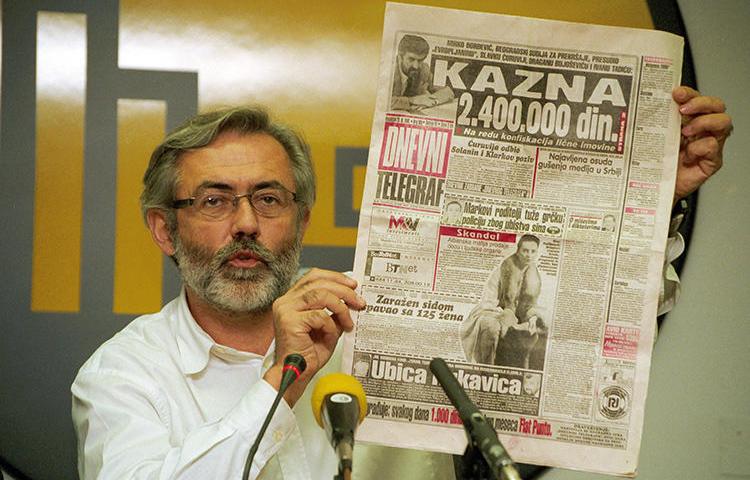
CPJ welcomes convictions in murder of Serbian journalist Slavko Ćuruvija
New York, April 5, 2019–A Belgrade court today convicted four former Serbian state security officers of the 1999 murder of journalist Slavko Ćuruvija, owner of the mass-circulation Dnevni Telegraf, Serbia’s first private daily, and the weekly magazine Evropljanin, independent regional news website Balkan Insight reported. Ćuruvija, 51, was shot and killed on April 11, 1999,…
1,000 deaths: Journalists who gave their lives
When Mick Deane was killed in Egypt on Wednesday, he became the 1,000th journalist documented by CPJ as having died in direct relation to his work. The photos above, a sampling of those who have died over the past 21 years, serve as a powerful reminder of the cost of critical, independent journalism.
Attacks on the Press in 2008: Serbia
Nationalists suffered a series of political defeats in 2008 and responded by lashing out against independent journalists and liberal reformers with threats and physical attacks. A reformist-nationalist coalition government led by the conservative Prime Minister Vojislav Kostunica during the first half of the year and by liberal President Boris Tadic during the second half failed…
Broadcast editor receives death threats
August 9, 2007 POSTED September 12, 2007 Stefan Cvetkovic, TNT, Bela Crkva THREATENED On August 9, Cvetkovic, editor in chief of the independent radiotelevision station TNT in the city of Bela Crkva, about 100 km (62 miles) east of the capital, Belgrade, received two anonymous phone calls from an unidentified number. A male voice threatened…
CPJ gravely concerned about threat against editor
Dear Prime Minister Kostunica: The Committee to Protect Journalists is deeply dismayed by the Serbian Interior Ministry’s failure to promptly respond to a credible death threat made against Grujica Spasovic, editor-in-chief of the Belgrade-based independent daily Danas (Today). An anonymous telephone threat was made to the newspaper on June 11 after Danas reported that your government has identified the town where indicted war criminal Ratko Mladic is hiding. We call on you to ensure that the threat is thoroughly investigated and that appropriate protection is provided to Spasovic.
Attacks on the Press 2004: Serbia and Montenegro
Serbia and MontenegroPolitical paralysis consumed Serbia for much of 2004. Conservative reformists and ultranationalists argued over the bloody legacy of former President Slobodan Milosevic and refused to extradite Serbs indicted for war crimes to The Hague–based U.N. -tribunal. Amid a chaotic and polarized atmosphere, journalists were vulnerable to -intimidation from politicians, government agencies, businessmen, accused…
Attacks on the Press 2003: Serbia and Montenegro
Serbia’s ruling reformist coalition, the Democratic Opposition of Serbia, (DOS), struggled to come to terms with the legacy of corruption and extreme nationalism left by a decade of rule under former Yugoslav President Slobodan Milosevic. Political division in the Federal Republic of Yugoslavia, powerful organized crime groups, and political apathy kept the conflict-ridden DOS coalition…
CPJ RECEIVES OSCE PRIZE FOR JOURNALISM AND DEMOCRACY
Acceptance Speech by Ann Cooper ON BEHALF OF THE AMERICAN JOURNALISTS WHO FOUNDED THE COMMITTEE TO PROTECT JOURNALISTS NEARLY A QUARTER OF A CENTURY AGO, I THANK YOU FOR THIS GREAT HONOR. THIS PRIZE COMES AT A CRUCIAL MOMENT FOR GLOBAL PRESS FREEDOM–A TIME WHEN MANY GOVERNMENTS, INCLUDING THE UNITED STATES, INCREASINGLY CITE THE WAR…
Attacks on the Press 2002: Yugoslavia
During 2002, the intense political and personal rivalry between Yugoslav president Vojislav Kostunica, a conservative nationalist, and Serbian prime minister Zoran Djindjic, a pragmatic reformist, consumed politics in Serbia, the dominant republic in the Yugoslav federation. The conflict, which stalled government reforms, was further complicated by negotiations between the two Yugoslav republics of Serbia and…
Prosecutor in journalist’s murder case suspended
New York, March 26, 2003—Sinisa Simic, the public prosecutor responsible for the stalled investigation into the April 1999 assassination of Dnevni Telegraf editor-in-chief Slavko Curuvija, has been temporarily suspended of his duties, according to local press reports. Serbia’s acting president Natasa Micic ordered the suspension on Friday, March 21, amid a government crackdown on judges…